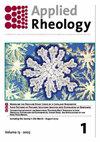使用流变学和流动可视化分析消费者配药瓶的复杂流体排放
IF 5.8
4区 工程技术
Q1 MECHANICS
引用次数: 2
摘要
复杂的液体,如凝胶、洗发水和面霜,在消费品行业中无处不在。然而,关于它们从消费包装中排放的信息很少,往往导致相当大的脚跟,即在排放过程完成后的残余废物。在这里,我们使用流变学分析和颗粒图像测速(PIV)来研究流变学不同的流体从配备改进的手动泵的点胶瓶中排出的情况。用卡罗方程拟合流变数据所建立的流变参数来描述流体。研究了浸管直径、吸压、体积流量等操作参数的影响。数据还根据无量纲感兴趣区域(ROI)进行了分析,该区域捕获了放电过程中流体中的相对“高速”区域,并直接使用PIV进行测量。在排出过程结束时,流变学和操作参数都会影响鞋跟。本文提出的结果可以通过测量透明流体和包裹的ROI来预测鞋跟,或者通过利用鞋跟与本工作中建立的操作和流变参数的相关性来预测鞋跟。图形抽象本文章由计算机程序翻译,如有差异,请以英文原文为准。
Analysis of complex fluid discharge from consumer dispensing bottles using rheology and flow visualization
Abstract Complex fluids, such as gels, shampoos, and creams, are ubiquitous in the consumer product industry. However, little information is available on their discharge from consumer packaging, often resulting in a considerable heel, i.e., the residual waste material after the discharge process is complete. Here, we used rheological analysis and particle image velocimetry (PIV) to investigate the discharge of rheologically different fluids from a dispensing bottle provided with a modified hand pump. The fluids were described in terms of rheological parameters established by fitting rheometric data with the Carreau equation. The effect of operational parameters was also studied, which included the dip tube diameter, suction pressure, and volumetric flow rate. The data were also analyzed in terms of the dimensionless region of interest (ROI), which captures the relative “high-velocity” region in the fluid during the discharge process and is measured directly using PIV. Both rheological and operational parameters affect the heel at the end of the discharge process. The results presented here enable predicting the heel either by measuring ROI as in the case of transparent fluids and packages or by making use of the heel correlation with operational and rheological parameters also established in this work. Graphical abstract
求助全文
通过发布文献求助,成功后即可免费获取论文全文。
去求助
来源期刊

Applied Rheology
物理-力学
CiteScore
3.00
自引率
5.60%
发文量
7
审稿时长
>12 weeks
期刊介绍:
Applied Rheology is a peer-reviewed, open access, electronic journal devoted to the publication in the field of applied rheology. The journal provides the readers with free, instant, and permanent access to all content worldwide; and the authors with extensive promotion of published articles, long-time preservation, language-correction services, no space constraints and immediate publication.
 求助内容:
求助内容: 应助结果提醒方式:
应助结果提醒方式:


